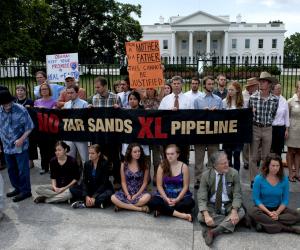[Note from Andrew: After a long hiatus here, I'm going to be re-publishing all my blog posts, whether from ASP, Energy Trends, or others on this blog, so I have a central location. Feel free to comment here]
From
ASP's Flashpoint blog:
Some have called this hurricane season a bust after a very quiet Atlantic storm season.(Here's Climate Central's Andrew Freeman detailing
why its been a quite Atlantic season). However, just because storms aren't running up the east coast of the United States into the media-friendly New York metro area, doesn't mean that there are no storms and that they aren't affecting people's lives.
Super Typhoon Haiyan in the Central Pacific is a massive storm that is poised to do extreme damage. As Brian Kahn, aslo of Climate Central, writes, right now it is on
a direct beeline to the Philippines. With maximum sustained winds of 185 miles per hour and a predicted storm surge of over 16 feet, this storm is likely to do massive damage to that country. This is the 5th typhoon to hit the Philippines this year, and the cumulative effect of that much rain alone is likely to cause mud slides and extensive damage.
Over in the Bay of Bengal, the East Coast of India was hit by
Cyclone Phailin in October. Fortunately, preemptive evacuations
saved many lives, but reports now indicate that
relief and recovery after the storm has been difficult. Japan, too, was hit hard by
Typhoon Wipha in mid October, killing many on an offshore island, and flooding some of the water cooling tanks at the stricken Fukushima nuclear power plant.
An increase in both the severity and frequency of tropical storms (hurricanes, typhoons, and cyclones, depending on the area of the world) is a predicted result of global climate change. The extent to which these storms will be caused by climate change is disputed in the scientific community, with only a medium confidence expressed by
the IPCC in the findings.
This year's storms in the Pacific underscore Admiral Lockelar's (the US Pacific Commander)
statement that climate change is most likely to undermine the security of the region. As the US Navy has done
in the past, they will participate in relief efforts in the Philippines from this storm. ASP's
Global Security Index on Climate a change indicates that the Philippines is aware that these storms are a security risk, but still lacks the capacity for support.
Last year, Sandy brought the conversation in the US back around to climate change. However, this year's quiet season seems to have quieted that talk. The truth remains, however, that we cannot afford to continue to take risks with a loaded dice. Just because this year the Atlantic Coast didn't role craps, that doesn't mean that climate change shouldn't remain at the top of the agenda. The problem is global, and the effects are global.
.jpg)
